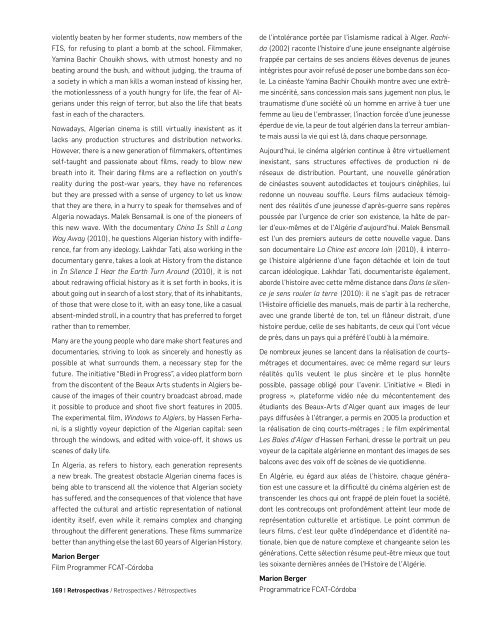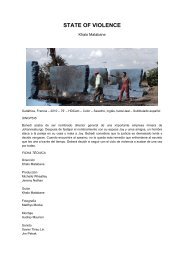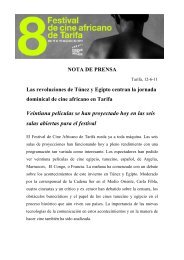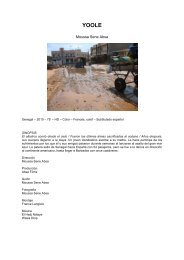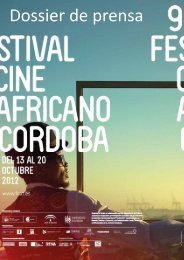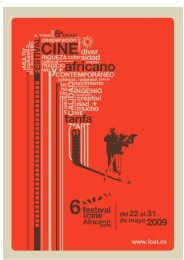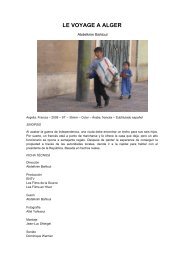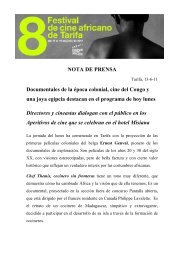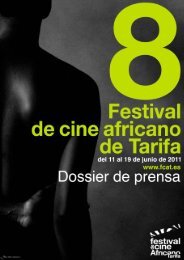Catálogo - FCAT
Catálogo - FCAT
Catálogo - FCAT
Create successful ePaper yourself
Turn your PDF publications into a flip-book with our unique Google optimized e-Paper software.
violently beaten by her former students, now members of the<br />
FIS, for refusing to plant a bomb at the school. Filmmaker,<br />
Yamina Bachir Chouikh shows, with utmost honesty and no<br />
beating around the bush, and without judging, the trauma of<br />
a society in which a man kills a woman instead of kissing her,<br />
the motionlessness of a youth hungry for life, the fear of Algerians<br />
under this reign of terror, but also the life that beats<br />
fast in each of the characters.<br />
Nowadays, Algerian cinema is still virtually inexistent as it<br />
lacks any production structures and distribution networks.<br />
However, there is a new generation of filmmakers, oftentimes<br />
self-taught and passionate about films, ready to blow new<br />
breath into it. Their daring films are a reflection on youth’s<br />
reality during the post-war years, they have no references<br />
but they are pressed with a sense of urgency to let us know<br />
that they are there, in a hurry to speak for themselves and of<br />
Algeria nowadays. Malek Bensamail is one of the pioneers of<br />
this new wave. With the documentary China Is Still a Long<br />
Way Away (2010), he questions Algerian history with indifference,<br />
far from any ideology. Lakhdar Tati, also working in the<br />
documentary genre, takes a look at History from the distance<br />
in In Silence I Hear the Earth Turn Around (2010), it is not<br />
about redrawing official history as it is set forth in books, it is<br />
about going out in search of a lost story, that of its inhabitants,<br />
of those that were close to it, with an easy tone, like a casual<br />
absent-minded stroll, in a country that has preferred to forget<br />
rather than to remember.<br />
Many are the young people who dare make short features and<br />
documentaries, striving to look as sincerely and honestly as<br />
possible at what surrounds them, a necessary step for the<br />
future. The initiative “Bledi in Progress”, a video platform born<br />
from the discontent of the Beaux Arts students in Algiers because<br />
of the images of their country broadcast abroad, made<br />
it possible to produce and shoot five short features in 2005.<br />
The experimental film, Windows to Algiers, by Hassen Ferhani,<br />
is a slightly voyeur depiction of the Algerian capital: seen<br />
through the windows, and edited with voice-off, it shows us<br />
scenes of daily life.<br />
In Algeria, as refers to history, each generation represents<br />
a new break. The greatest obstacle Algerian cinema faces is<br />
being able to transcend all the violence that Algerian society<br />
has suffered, and the consequences of that violence that have<br />
affected the cultural and artistic representation of national<br />
identity itself, even while it remains complex and changing<br />
throughout the different generations. These films summarize<br />
better than anything else the last 60 years of Algerian History.<br />
Marion Berger<br />
Film Programmer <strong>FCAT</strong>-Córdoba<br />
169 | Retrospectivas / Retrospectives / Rétrospectives<br />
de l’intolérance portée par l’islamisme radical à Alger. Rachida<br />
(2002) raconte l’histoire d’une jeune enseignante algéroise<br />
frappée par certains de ses anciens élèves devenus de jeunes<br />
intégristes pour avoir refusé de poser une bombe dans son école.<br />
La cinéaste Yamina Bachir Chouikh montre avec une extrême<br />
sincérité, sans concession mais sans jugement non plus, le<br />
traumatisme d’une société où un homme en arrive à tuer une<br />
femme au lieu de l’embrasser, l’inaction forcée d’une jeunesse<br />
éperdue de vie, la peur de tout algérien dans la terreur ambiante<br />
mais aussi la vie qui est là, dans chaque personnage.<br />
Aujourd’hui, le cinéma algérien continue à être virtuellement<br />
inexistant, sans structures effectives de production ni de<br />
réseaux de distribution. Pourtant, une nouvelle génération<br />
de cinéastes souvent autodidactes et toujours cinéphiles, lui<br />
redonne un nouveau souffle. Leurs films audacieux témoignent<br />
des réalités d’une jeunesse d’après-guerre sans repères<br />
poussée par l’urgence de crier son existence, la hâte de parler<br />
d’eux-mêmes et de l’Algérie d’aujourd’hui. Malek Bensmaïl<br />
est l’un des premiers auteurs de cette nouvelle vague. Dans<br />
son documentaire La Chine est encore loin (2010), il interroge<br />
l’histoire algérienne d’une façon détachée et loin de tout<br />
carcan idéologique. Lakhdar Tati, documentariste également,<br />
aborde l’histoire avec cette même distance dans Dans le silence<br />
je sens rouler la terre (2010): il ne s’agit pas de retracer<br />
l’Histoire officielle des manuels, mais de partir à la recherche,<br />
avec une grande liberté de ton, tel un flâneur distrait, d’une<br />
histoire perdue, celle de ses habitants, de ceux qui l’ont vécue<br />
de près, dans un pays qui a préféré l’oubli à la mémoire.<br />
De nombreux jeunes se lancent dans la réalisation de courtsmétrages<br />
et documentaires, avec ce même regard sur leurs<br />
réalités qu’ils veulent le plus sincère et le plus honnête<br />
possible, passage obligé pour l’avenir. L’initiative « Bledi in<br />
progress », plateforme vidéo née du mécontentement des<br />
étudiants des Beaux-Arts d’Alger quant aux images de leur<br />
pays diffusées à l’étranger, a permis en 2005 la production et<br />
la réalisation de cinq courts-métrages ; le film expérimental<br />
Les Baies d’Alger d’Hassen Ferhani, dresse le portrait un peu<br />
voyeur de la capitale algérienne en montant des images de ses<br />
balcons avec des voix off de scènes de vie quotidienne.<br />
En Algérie, eu égard aux aléas de l’histoire, chaque génération<br />
est une cassure et la difficulté du cinéma algérien est de<br />
transcender les chocs qui ont frappé de plein fouet la société,<br />
dont les contrecoups ont profondément atteint leur mode de<br />
représentation culturelle et artistique. Le point commun de<br />
leurs films, c’est leur quête d’indépendance et d’identité nationale,<br />
bien que de nature complexe et changeante selon les<br />
générations. Cette sélection résume peut-être mieux que tout<br />
les soixante dernières années de l’Histoire de l’Algérie.<br />
Marion Berger<br />
Programmatrice <strong>FCAT</strong>-Córdoba


